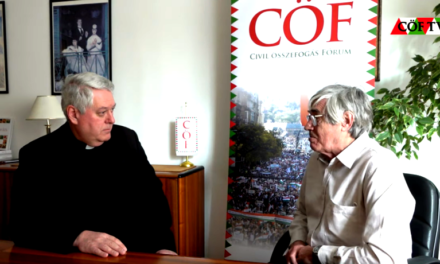At the expense of their own countries and societies, the leaders of the union voluntarily take on the role of Sancho Panza (without his sanity) to serve the American windmill fight.
The Daily Telegraph writes that Fico is playing to the tune of Orbán, because he is shamelessly running a populist campaign, takes a softer position towards Moscow, urges peace negotiations, and compared the NATO troops stationed in Slovakia to the Nazis.
The antecedent of the criticism, as already written in the Slovak and Hungarian papers, is that
Robert Fico, the president of Smer-SD, criticized NATO's planned campaign in Slovakia, which aims to promote military assistance to Ukraine.
Fico considers this to be interference in the upcoming parliamentary elections, as the information campaign is planned for the summer, and in terms of age and education, it is aimed at strata that correspond to the Smer-SD voting base. Fico demands that NATO postpone this campaign until after the parliamentary elections in September. Fico's accusations were of course rejected by the current pro-NATO Slovak government, saying that the NATO campaign was not launched with the aim of interfering in the elections, they just wanted to raise awareness of the benefits of NATO membership and explain the importance of supporting Ukraine in terms of Slovakia's security.
There is no doubt that this explanation is necessary, because according to NATO's own survey, just over half (51 percent) of Slovaks would vote to remain in the alliance if a referendum were held, and 51-60 percent of the 25- to 64-year-olds do not want to send more aid to Ukraine. All this wouldn't be such a big deal if Fico's party wasn't about to win before the autumn elections.
The party has increased its popularity by four percentage points in the past year
(from 15 to 19 percent), while the rival Social Democrats (HLAS–SD) lost essentially the same amount (from 19 percent to 16 percent).
The fact that it is closely related to Slovakia only adds to the problem
Andrej Babis is also at the forefront in the Czech Republic, who also plays from Orbán's music, especially with regard to migration.
But the horrors could be listed further, as the Daily Telegraph article lists: in Austria the Freedom Party of Austria leads the popularity list, in Germany the Alternative for Germany (AfD) is the second most popular party (its support has increased from 10 to 20 percent in the last 12 months), and populist (and pro-Russian) forces are also gaining strength in Greece, which, if they come to power, may block arms shipments to Ukraine .
And this is not the end of the list, as there are the Italian and Swedish governments, where the populist forces playing to the tune of Orbán, that is, those who protect national interests, also have significant influence.
Orbán's score is nothing more than the protection of national interests against the interests of supranational powers.
If the leaders of the union were to play according to Orbán's score, then first of all there would be no uncontrolled immigration, each country would be able to accept as many immigrants as it sees fit, and there would be no mandatory migrant acceptance quota. In addition, there would be no climate hysteria, gender madness, and above all there would be no Russian-Ukrainian (NATO) war, because Ukraine and Georgia would not have been invited to join NATO at the 2008 NATO summit in Bucharest, which is the primary cause of the war, and even the wish of the Ukrainians would have been fulfilled, since at that time two-thirds of the Ukrainians rejected NATO membership. To this, just as a reminder, let us add that the invitation of Ukraine and Georgia to Bucharest was opposed by all six countries that founded the European Economic Community and Hungary, but Europe's leaders did not have enough courage and perseverance to resist the pressure of the Bush administration.
Since then, the situation has worsened to the extent that the leaders of the union voluntarily assume the role of Sancho Panza (without his sanity) to serve the American windmill fight, at the expense of their own countries and societies.
If Europe played from Orbán's score, there would be no problem with Europe's energy supply, energy prices would not have risen to the current heights, and European industry would not be degraded and lose its competitiveness and a significant part of its markets. According to Orbán's score, Europe would not be interested in assuming a law enforcement role in the Indo-Pacific region - 15-20 thousand kilometers from Europe.
Orbán's score would therefore serve Europe's fundamental interests, but why this sanity appears only in parties branded as extreme right-wing parties may be shed some light on the background of The Daily Telegraph's article. The paper, like almost all major papers in the Euro-Atlantic region, was founded sometime in the 19th century and was bought by large financial corporations at the end of the 20th century. Accordingly, these papers, including The Daily Telegraph, serve the interests of these financial giants. The article writer himself, James Crisp, is the paper's editor dealing with European affairs, and in order not to have to read too much local news in a language he does not understand, most of his reports are made up of the opinions of experts who know the region better, in this case the opinion of one of the experts of the German Marshall Fund of the United States.
The fund itself is funded by the United States, its various agencies, and other financial foundations and corporations. The expert is called Daniel Hegedüs, who is often quoted by publications such as AFP, Financial Times, New York Times, Euractiv, EU Observer and Der Spiegel. He himself studied political science, history and European law at Eötvös Loránd University in Budapest. On his website , we can find almost exclusively articles criticizing Hungary, which he published in the above-mentioned media.
This specific example highlights what background power means. It starts with the educational institutions, where the appropriate experts are trained and selected. They then escape to international institutions that are financed by some governments and large financial corporations, and finally they give ammunition to the media, which are also supported by large financial foundations. Since at least ninety percent of the communication in the Euro-Atlantic region is structured in this way,
the average European gets information essentially only from these mainstream media, with the political trend also presented by the cited article.
The Nazi Propaganda Minister Goebbels is credited with the saying that people believe everything, they just have to be told many times, which practice proves. If a Western citizen finds in every media he reads or watches that the party that offers him an alternative, such as the German AfD or the Austrian Freedom Party, is a far-right party, he will think twice about voting for it, even if he agrees with its program, lest his political commitment become known, which could even cost him his job.
This is why the support of these far-right parties is only growing slowly, even though when pollsters ask specific questions to the population, it usually turns out that the majority's opinion is close to the policies of these parties.
The same is true in the case of Hungary: if you don't ask how sympathetic Orbán is, but rather, for example, about the utility reduction or the Hungarian position taken in the Russian-Ukrainian war, it turns out that a significant part of those who otherwise voted against Fidesz also support this policy.
The biggest problem of alternative parties is that they do not have the financial, intellectual and media support that mainstream parties have. It is difficult to change this, I see the possibility of progress primarily in creating the intellectual background and relying on the so-called alternative media undertaken by the volunteers, because this can be achieved even without significant financial resources.
Orbán's score, that is, the policy of protecting national interests and traditional values, should be included in a system at the European level (similar to what was included in the 1957 Treaty of Rome establishing the European Economic Community), and then perhaps European citizens would have more courage to vote for the parties that best represent their interests.
The author is an economist and a consultant to the National Forum
Featured image: Viktor Orbán's Facebook page












